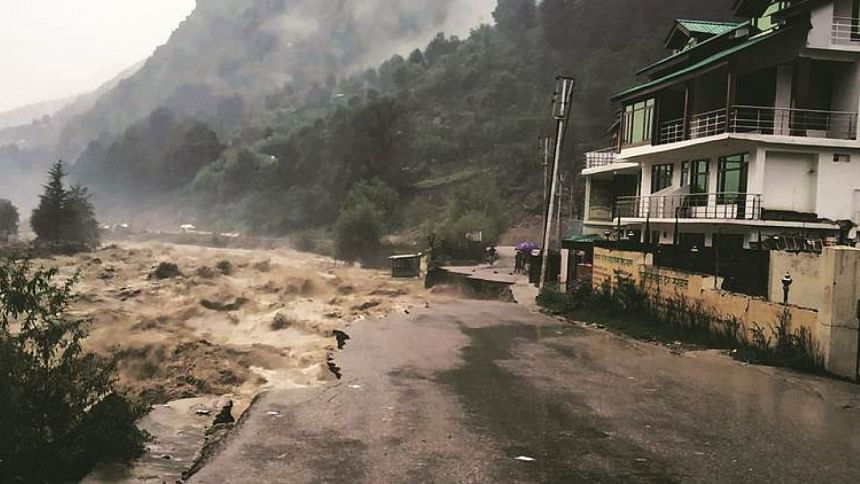22 dead as heavy rain triggers flash floods, landslides in India

Flash floods and landslides triggered by heavy rain in parts of north India led to the death of at least 22 people in Punjab, Himachal Pradesh and Jammu and Kashmir. Punjab and Himachal Pradesh have issued a red alert, The Indian Express reports.
Water levels in rivers rose across the region, with the level in Pong Dam nearing danger mark. Bhakra Beas Management Board announced the release of 49,000 cusecs of water from Pong dam at 3:00 pm(local time) today into Beas river. Around 1 lakh cusecs were released late night from Ropar barrage into Sutlej. Administration of these districts was directed to maintain vigilance. On Punjab government's request, Army columns were kept on standby.
Haryana put its officers on high alert following increase in water level in Yamuna. At local time 8:00 pm yesterday, 2.16 lakh cusecs of water was released from Hathnikund Barrage in Yamunanagar district. Water was likely to reach Delhi in 72 hours. However, officers told The Indian Express that Yamuna and Ghaggar rivers in Haryana were below the danger mark.
Eight people died in Himachal and eight in Punjab. They included an eight-year-old girl who drowned in a ditch in Jalandhar, and a man and his 12-year-old son in Amritsar, whose car fell into a drain. Five people died in incidents of roof collapse in Kapurthala and Nawanshahr.
In Himachal, three persons were washed away when their car fell in the Beas river near Manali, two were washed away in Parbati river in Manikaran valley, a girl died in Bajaoura in Kulli and a man drowned in Kangra district.
In J&K's hilly Doda district, five members of a family were killed as a landslide hit their mud house. Another woman was killed when a stone from a hill hit her at Marmat yesterday. Meanwhile, 29 people were rescued from flash floods in Kathua district.
In Uttarakhand, a five-metre stretch of the bridle path near Lincholi, which is on the way to Kedarnath, was washed out, leaving 500 pilgrims stranded. Rudraprayag District Magistrate Mangesh Ghildiyal said, "Relief works are on. Efforts will be made to take all stranded pilgrims out of the Valley on Tuesday."
Road, rail and air traffic were disrupted throughout the day across the region. There were reports of 15-20 per cent kharif crop damage (cotton, bajra, paddy and moong) across Punjab and Haryana. Earlier in the day, Chief Ministers of Punjab, Haryana and Himachal Pradesh chaired emergency meetings.
According to IMD, from Sunday till 8.30 am today, Punjab's Pathankot and Gurdaspur witnessed highest rainfall of 240 mm; while Himachal Pradesh, Kalatop (Chamba district) witnessed 225 mm rainfall and Haryana's Asandh in Karnal witnessed 160 mm of rainfall.
According to IMD, the intensity of rainfall is likely to begin receding today.
Source: The Indian Express

 For all latest news, follow The Daily Star's Google News channel.
For all latest news, follow The Daily Star's Google News channel. 




Comments